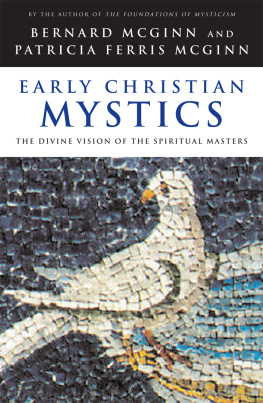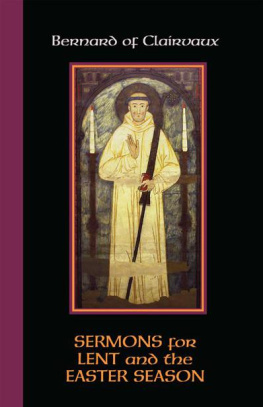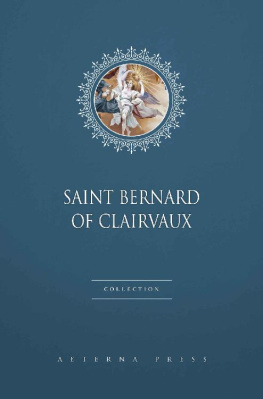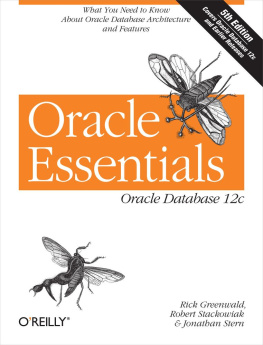Abbe Theodore Ratisbonne - St. Bernard of Clairvaux: Oracle of the Twelfth Century
Here you can read online Abbe Theodore Ratisbonne - St. Bernard of Clairvaux: Oracle of the Twelfth Century full text of the book (entire story) in english for free. Download pdf and epub, get meaning, cover and reviews about this ebook. year: 2015, publisher: TAN Books, genre: Science. Description of the work, (preface) as well as reviews are available. Best literature library LitArk.com created for fans of good reading and offers a wide selection of genres:
Romance novel
Science fiction
Adventure
Detective
Science
History
Home and family
Prose
Art
Politics
Computer
Non-fiction
Religion
Business
Children
Humor
Choose a favorite category and find really read worthwhile books. Enjoy immersion in the world of imagination, feel the emotions of the characters or learn something new for yourself, make an fascinating discovery.

- Book:St. Bernard of Clairvaux: Oracle of the Twelfth Century
- Author:
- Publisher:TAN Books
- Genre:
- Year:2015
- Rating:4 / 5
- Favourites:Add to favourites
- Your mark:
- 80
- 1
- 2
- 3
- 4
- 5
St. Bernard of Clairvaux: Oracle of the Twelfth Century: summary, description and annotation
We offer to read an annotation, description, summary or preface (depends on what the author of the book "St. Bernard of Clairvaux: Oracle of the Twelfth Century" wrote himself). If you haven't found the necessary information about the book — write in the comments, we will try to find it.
St. Bernard of Clairvaux: Oracle of the Twelfth Century — read online for free the complete book (whole text) full work
Below is the text of the book, divided by pages. System saving the place of the last page read, allows you to conveniently read the book "St. Bernard of Clairvaux: Oracle of the Twelfth Century" online for free, without having to search again every time where you left off. Put a bookmark, and you can go to the page where you finished reading at any time.
Font size:
Interval:
Bookmark:
St. Bernard of Clairvaux
Oracle of the Twelfth Century 1091-1153
Abb Theodore Ratisbonne
Previously published by P. I. Kennedy & Sons, New York (and also by D. and J. Sadlier), in a volume bearing no date. The Library of Congress has a date of 1835 for its Sadlier edition.
Library of Congress Catalog Card No.: 91-67795
Cover picture: 16th-century portrait of St. Bernard from Clairvaux Abbey, now in Troyes Cathedral.
TAN Books
Charlotte, North Carolina
www.TANBooks.com
2012

St. Bernard of Clairvaux (1091-1153). From an ancient bust in the Parish Church of Fontaines-les-Dijon, France, his birthplace.
THE MEMORARE
Famous Prayer of St. Bernard of Clairvaux
R EMEMBER, O most gracious Virgin Mary, that never was it known that anyone who fled to thy protection, implored thy help or sought thy intercession was left unaided. Inspired with this confidence, I fly unto thee, O Virgin of virgins, my Mother. To thee do I come, before thee I kneel, sinful and sorrowful. O Mother of the Word Incarnate, despise not my petitions, but in thy mercy hear and answer them. Amen.
CONTENTS
Advice of St. Bernard to His Sister, A Nun
Preface
BY CARDINAL MANNING
T HE "Life of St. Bernard" by the Abbe Ratisbonne has already taken its place in the ecclesiastical literature of France. Among its least excellences will be found the strain of pure and natural eloquence in which the narrative is told.
St. Bernard was so eminently the saint of his age that it would be impossible to write his life without surrounding it with an extensive history of the period in which he lived, and over which he may be truly said to have ruled. The Abb Ratisbonne has, with this view, very ably and judiciously interwoven with the personal narrative and description of the Saint the chief contemporaneous events and characters of the time.
There is, perhaps, in the annals of the Church no more remarkable instance of the power of an individual over the men of his age than in St. Bernard. A solitary religious, in the state of poverty, without office, or rank, or worldly control, or even the ecclesiastical dignities which command the obedience of others, he acquired and wielded a sway over, not his own brethren of the cloister alone, but over people of every character, rank, and stateover the priesthood, over the episcopate, over princes, kingdoms, nations, and pontiffs. The means and appliances for this vast and sustained superiority of the individual over his age were all contained within the four walls of his cell; or, more truly, within the one great heart, inflamed with the love of God; the solitary intelligence, illuminated by the light of faith; and the single will, energetic in itself, and made inflexible by union with the Divine. There seems to have been in this one mind an inexhaustible abundance, variety, and versatility of gifts. Without ever ceasing to be the holy and moritifed religious, St. Bernard appears to be the ruling will of his time. He stands forth as pastor, preacher, mystical writer, controversialist, reformer, pacificator, mediator, arbiter, diplomatist, and statesman. He appears in the schools, at the altar, in the preacher's chair, in councils of the Church, in councils of the State, amid the factions of cities, the negotiations of princes, and the contests of anti-popes. And whence came this wondrous power of dealing with affairs and with men? Not from the training and schooling of this world, but from the instincts, simplicity, and penetration of a mind profoundly immersed in God, and from a will of which the fervor and singleness of aim were supernatural.
His hand was laid, not upon the mechanism of society, but upon the motive powers which originate and sustain its action. We can hardly conceive St. Bernard invested with the ordinary routine of any official functions, how high soever they might be; they would have changed the whole idea of his life, and the whole balance and harmony of his character. It is wholesome and timely, and in an age like this, when the development of individual character is retarded and kept down by the mechanical forms and movement of modern systems, to lay open and to exhibit what are the true sources of beneficent and controlling power. They are not to be found in the customs and contrivances of social or public institutions, but in the individual, strengthened and elevated by intellectual, and above all, by spiritual culture, through the supernatural grace of the Holy Ghost, the guide and teacher of the Church. Individuals are powerful for good in proportion as they are penetrated and governed by the mind of the mystical body, the one true Church of God, Catholic and Roman, which, from age to age, throughout the world, teaches, judges, and rules in the name and by the presence of Jesus Christ.
The servants of God, in surrendering their individual will and intelligence to the Divine guidance, become, as individuals, perfect and powerful for good. In dying to themselves, they are raised again to another and vaster sphere of life. Out of the one Church, where individuals jealously retain and strive to unfold their personal gifts and influence, they descend in the scale of power; and their greatest works die with them, or survive but a little while, without succession or reproduction. A supernatural principle is necessary to their perfection and their perpetuity, which is to be found alone in the unity of the Church and the mysteries of the altar.
Another reason, also, makes the publication of St. Bernard's life very opportune at this moment.
He stands, with other great and saintly namessuch as St. Anselm, St. Francis, St. Bonaventure, St. Peter Damian, and, in these latter days, St. Alphonsusas a witness to the great spiritual law, that the love of the Virgin Mother of God is not a sentiment or poetry in religion, which may or may not be encouraged by individuals at their will; but that love and veneration, second only to that we pay to her Divine Son, is due to her, by a law which springs from the very substance of the Faith.
It is impossible to realize the Incarnation as we ought, and not to love and venerate the Mother of God; it is impossible to love the Son without loving the Mother. In proportion to our love to the Son will be our love to the Mother who bore Him; insofar as we are conformed to the likeness of the Son, we shall love the Mother, who, next to the Eternal Persons, the Father and the Holy Ghost, is the dearest object of the love of the Eternal Son. The love of the Mother of God is the overflow of the love we bear to her Divine Son; it descends from Him to her; and we may measure our love to Him by our love to her. It is impossible to be cold, distant, dry, or reserved towards the Mother of our Redeemer, and to be fervent in our love to Him. Such as we are to Him, such, in due measure, we shall be to her.
Now, of all the writers of the first thousand years of the Church, none is more full of fervent, tender, and adoring love to our Divine Lord, Jesus Christ, than St. Bernard, and none is more conspicuous for ardent love and veneration for the Mother of God. The same burning heart, kindled from Heaven, in him is seen beating with love to God in the mystery of the Three Divine Personsto the Incarnate Wordto her who, though infinitely below her Son, as the creature is below the uncreated, is, yet, immensely above all creatures, human or heavenly, inasmuch as she is the Mother of God.
Again, the name of St. Bernard has been so often invoked by the opponents of the doctrine of the Immaculate Conception, lately defined and declared by the voice of the Church, that it will not be amiss to state what the doctrine of the Saint on this point really was.
Next pageFont size:
Interval:
Bookmark:
Similar books «St. Bernard of Clairvaux: Oracle of the Twelfth Century»
Look at similar books to St. Bernard of Clairvaux: Oracle of the Twelfth Century. We have selected literature similar in name and meaning in the hope of providing readers with more options to find new, interesting, not yet read works.
Discussion, reviews of the book St. Bernard of Clairvaux: Oracle of the Twelfth Century and just readers' own opinions. Leave your comments, write what you think about the work, its meaning or the main characters. Specify what exactly you liked and what you didn't like, and why you think so.







